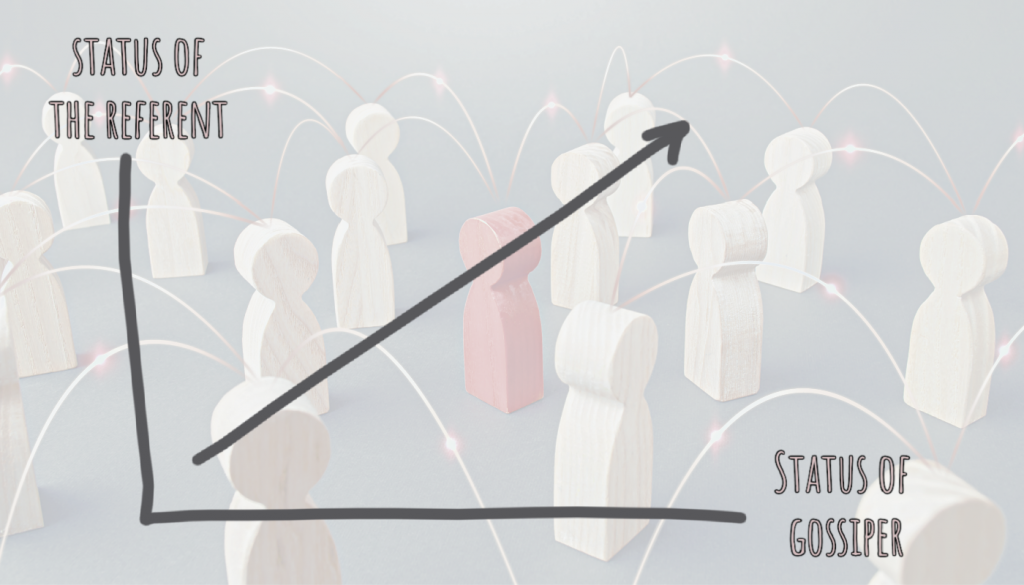Blog
Gossip. It’s something we all do, though few will admit to it. If you’ve ever felt an urge to share information about someone you know, especially when it’s unflattering, you’re not alone. We all experience a desire to gossip.
But why is this the case? Have you ever wondered why bad news spreads faster? And if everybody participates in spreading gossip, why do we still feel gossiping is taboo?
Yeah, why?
Gossiping can be seen by some as a bonding activity, typically between a small group of individuals of the same social rank, and can play a significant role in managing relationships. In this way, people have the ability to gain information about select individuals without personally speaking to them.
When gossiping, people tend to comment on behavior and its appropriateness in specific situations. Gossip often informs individuals as to what is considered socially acceptable behavior within society and has the ability to set the boundaries of what’s socially acceptable.

Gossip can also be viewed as a balance changer in a zero-sum game of power. Research suggests humans are hardwired to gain reputation by damaging others. Thus, gossip can be used to egotistically increase one’s status by damaging the competence of their rivals. For instance, an individual may share information that can make a rival less attractive to potential mates.
As an example, imagine a situation where you find yourself gossiping about someone you don’t get along with. In all likelihood, you will experience a bitter-sweet feeling of satisfaction. This is because you know the damning information you possess about that person can harm their reputation. The fact you are gossiping directly affects your status and the status of others around you.
Ultimately, gossip has the ability to inform others of a change in an individual’s social status and power. Gossiping can also be referred to as a method for social rank mobility, which is undoubtedly one of the main interests of most human beings.
Gossiping and social rank
Humans are highly interested in information that can positively affect their social rank. Gossiping is a form of social manipulation. Obtaining damning information about someone with a higher social rank than yourself essentially benefits your own social status, considering that the higher status your recipient (the one whom you are gossiping with) is, the more you benefit. Gossiping with a person who has a higher status than yourself has the potential to increase your status considerably. In the same sense, gossiping about someone with a lower status can have the same benefit, but to a lesser degree.
To expand on this point further, spreading information about an individual lower than you or who is considered your inferior is socially ineffectual, and you may even be perceived as a blabbermouth because your recipient might believe you are spreading negative information about them. Overall, gossiping about someone who possesses lower status than yourself is rarely worth the effort. In some circumstances, it can even harm your reputation. The mere fact that you were spending time sharing social information with a person benefits his status, if he and the referent (who you gossip about) are both your inferiors.
Moving beyond the negative aspects of gossip (sharing negative information about someone), there are also positive aspects as well, such as name-dropping and fawning, each plays a role in setting social status.
When you are sharing positive information about someone who is your superior, you may be perceived as a sycophant. If both the recipient and the informant are higher than you in status, your words may be voiced as flattery, which may across as groveling and has the potential to harm your status. On the other hand, name dropping is what occurs when you mention someone who is of a higher status to a person who is lower in status than you. In this instance, you are likely to benefit.

Do dominant and competent people gossip?
The answer is a resounding yes. Of course, they do! Everyone gossips. By gossiping, people remain connected with one another. But we have to keep in mind that gossipers can decide not to share what they know, depending on the content, the context, or their relationship with the other actors.
People mostly gossip with peers of the same status. It is unlikely a person of high status will gossip with someone of a lower status. For example, lawyers tend to gossip with other lawyers, and CEOs often gossip with other C-Level peers. However, it’s unlikely that you will see an executive gossiping with someone in a junior position.
A competent person is more likely to be cautious with whom they gossip with and the people they gossip about. This is because their high social status is at stake. A high-status individual will probably gossip with someone who they trust with information and who will responsibly use that information, which narrows down the group of potential gossipers.
Furthermore, highly competent people tend to gossip in secret or convey the gossip implicitly. They exercise caution concerning the partners they gossip with and the people they gossip about. All things being equal, highly competent people do not need to use gossip as a tool for social mobility for one obvious reason – they are already sitting at the top of the hierarchy.
To sum things up
The way we gossip is somewhat of a system that reflects the social hierarchy. It takes two notions into consideration. First, people primarily benefit from rumors over those who are above them in the hierarchy; the higher status your recipient is, the more likely you will benefit. Second, the higher you are in the hierarchy, the more discreetly people will gossip, requiring information to be retrieved implicitly, whereas the lower you are on the hierarchy, the more overt and explicit people will gossip about others.

